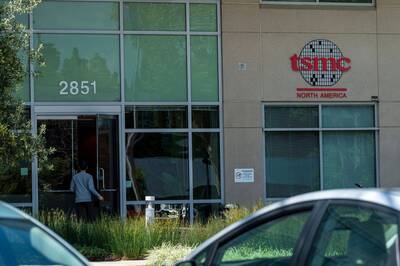《TAIPEI TIMES》 International arrivals’ quarantine cut

Airport staff provide COVID-19 tests to arriving passengers at Taiwan Taoyuan International Airport on Wednesday last week. Photo: Yao Chieh-hsiu, Taipei Times
FURTHER EASING POSSIBLE: Border control measures would be relaxed carefully, but more policy updates might be announced before September, the health minister said
By Lee I-chia / Staff reporter, with CNA
The Central Epidemic Command Center (CECC) has reduced the quarantine period for all international travelers arriving in Taiwan after 12am on Wednesday to three days of home quarantine, followed by four days of self-disease prevention.
It also announced revised rules for Taiwan-based airline crew, exempting quarantine for those who have received a booster dose of a COVID-19 vaccine more than 14 days beforehand.
Minister of Health and Welfare Chen Shih-chung (陳時中), who heads the center, said that from 12am on Wednesday, according to the scheduled arrival time, all travelers — irrespective of nationality and visa status — arriving in Taiwan would be eligible for the new policy.
The current policy is seven days of quarantine followed by seven days of self-health management, while the new policy is three days of home quarantine, followed by four days of self-disease prevention.
During the self-monitoring period, people are contacted daily by local authorities, but they can go out if they do not show symptoms, while avoiding gatherings and hospital visits.
The new policy does not require a self-health management period, Chen said.
However, travelers would still be required to present the negative result of a COVID-19 polymerase chain reaction (PCR) test taken within two days of boarding their flight.
Chen said a saliva-based PCR test would be required at the airport on arrival, adding that travelers can take a disease prevention vehicle, or a private vehicle driven by a family member or friend or dispatched by a facility, to the quarantine location.
Inbound travelers must spend three days in home quarantine, he said, adding that they must then perform four days of self-disease prevention, in which they can go out to work or to buy necessities as long as they have tested negative using a rapid antigen test at home the same day or the previous day.
Chen said each inbound traveler aged two or older would receive two at-home rapid test kits at the airport for use if they develop symptoms and before they leave the quarantine location for the first time.
They must also wear a mask and maintain social distance when going out during the self-disease prevention period, he added.
While unnecessary outings should be avoided, they can perform work duties, such as contractual obligations, visiting people, giving lectures or attending meetings, he said, adding that they should avoid going to crowded places or being in contact with strangers, and nonurgent medical treatment or examinations should be postponed.
Business travelers who have contractual obligations can eat alone or with specified people, but with dividers or under proper social distance at a separate space in a restaurant, he added.
Migrant workers, fishers and students are not allowed to go to work or school while performing self-disease prevention, due to the increased risk of cluster infections, the CECC said.
Chen said there would initially be a cap of 25,000 arrivals per week.
In addition, the minister announced that also starting at 12am on Wednesday, fully vaccinated, Taiwan-based airline crew members who have had a booster shot would be subject to a policy of “testing to replace quarantine.”
Fully vaccinated crew members who have had booster shots would be subject to seven days of self-health monitoring, a PCR test on the day of arrival, and a rapid or PRC test every two days after returning on a long-haul flight.
They would be subject to five days of self-health monitoring — a rapid or PCR test every day, until five days after the last flight duty — after returning on a short-haul flight.
Crew members who are not fully vaccinated would be required to follow a “3+4 quarantine” policy — three days of home quarantine, followed by four days of self-health monitoring after returning from a long-haul flight.
They are required to follow seven days of self-health monitoring, including a rapid or PRC test every day for seven days after the last flight duty after returning from a short-haul flight.
Asked if there is a possibility of easier overseas travel before September, Chen said it is possible, but border control measures would be eased very carefully.
He said the inbound traveler capacity cap would for now be expanded from about 18,000 to 20,000 people per week, and if infection control measures run smoothly, reopening might be accelerated.
新聞來源:TAIPEI TIMES



















